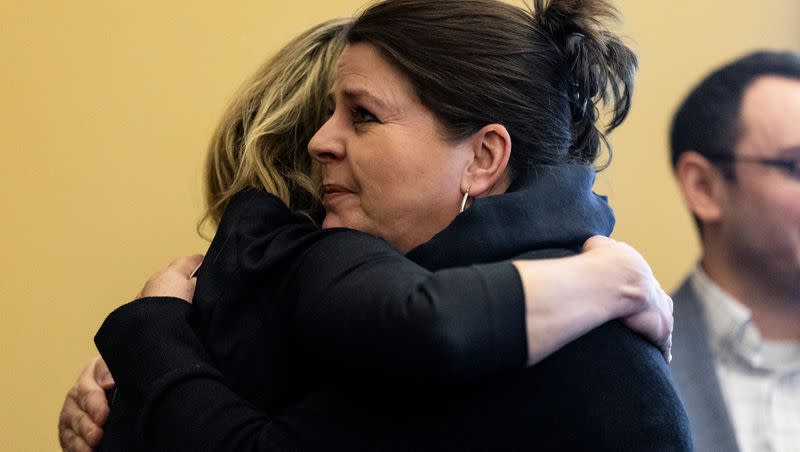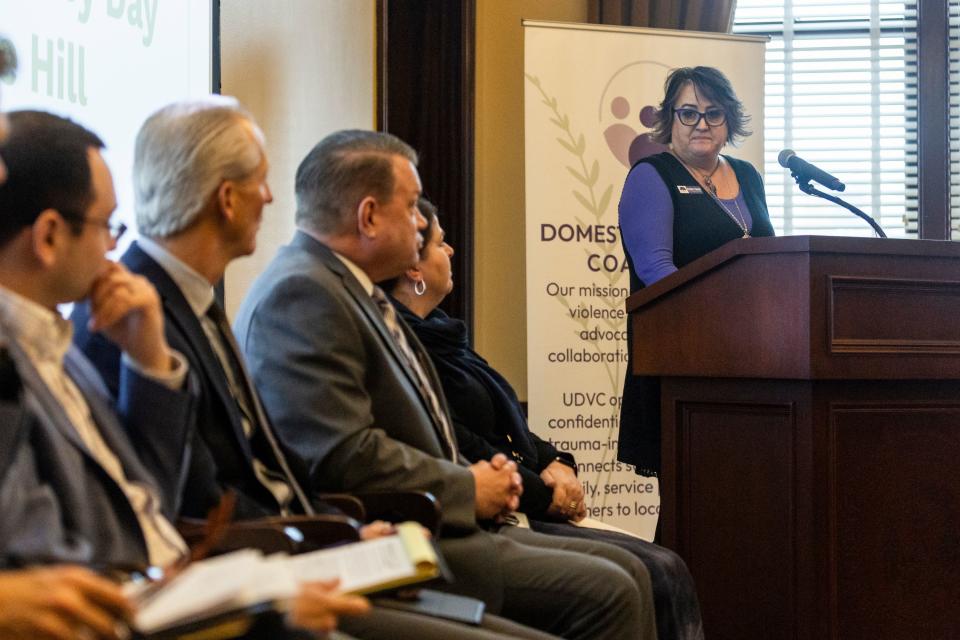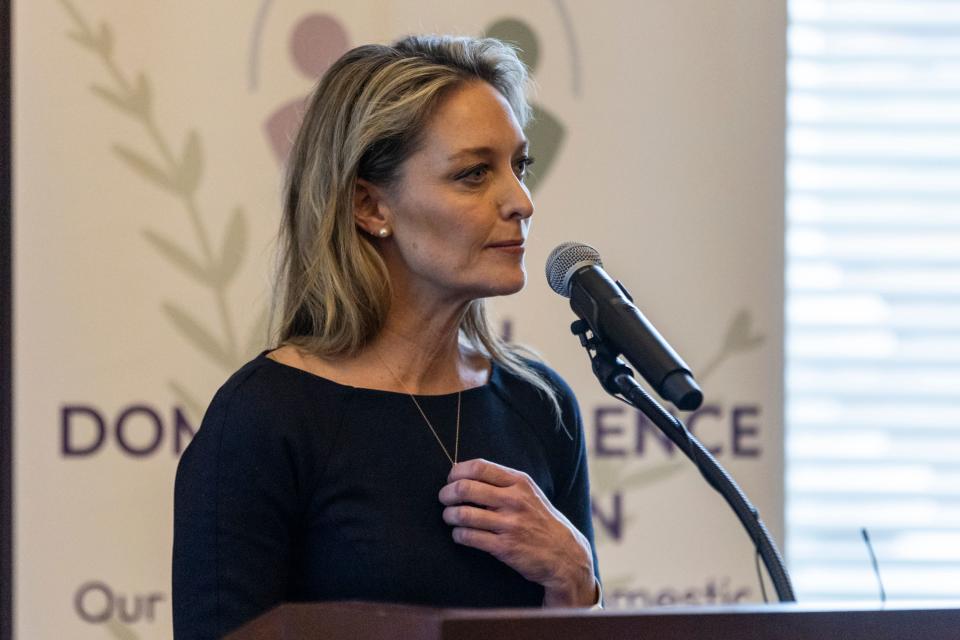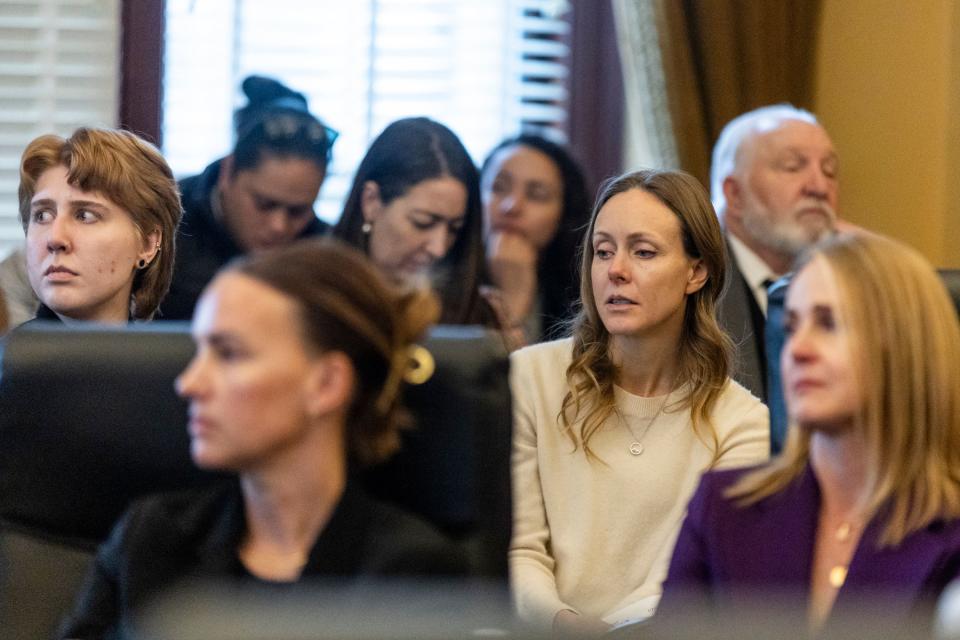How Utah might tackle its domestic violence epidemic

- Oops!Something went wrong.Please try again later.
More than a year has passed since Tausha Haight, her mother Gail Earl and her five children were shot and killed by her husband before he killed himself in Enoch, Iron County.
Lawmakers in Utah have somberly referenced the homicides when explaining the toll domestic violence has taken on communities. “Domestic violence is absolutely just a destroyer of our communities,” Rep. Tyler Clancy, R-Provo said in an interview. “And it’s not just one family that’s impacted by the scores of domestic violence. It’s an entire community.”
In response to the devastation, Utah legislators have introduced bills aimed at holding perpetrators accountable, providing resources to victims and shifting the culture. But no single policy holds the solution and work remains, lawmakers and advocates agree.
The Utah Legislature is considering bills that lawmakers and advocates consider important in the fight against domestic violence.
Courts and cops
Rep. Matthew Gwynn, R-Farr West, introduced HB81 to add “the crime of propelling a bodily substance or material” to the list of crimes that may qualify as a domestic violence offense.
An officer described such an experience from a domestic violence investigation, Gwynn said, “and it sounds as if this individual could or should or would have been charged with propelling a bodily substance.”
“It’s basically about spitting,” said Erin Jemison, director of public policy for the Utah Domestic Violence Coalition, a group that supports the measure. “This says, let’s make sure it’s clear that is also a form of domestic violence, to spit in someone’s face or propel other bodily fluid.”
Spitting in a person’s face can be a class A misdemeanor, Gwynn said. Adding this crime to offenses that could qualify as domestic violence would give those experiencing domestic violence additional legal options.
“Let’s say during the course of the domestic violence, one spouse spits in the face of the other,” Gwynn said, noting the officer would make an arrest and book the individual, who would be issued a jail release agreement. “In the event they’re released from jail, they would not be able to go home. They would not be able to have contact with the victim. And the victim would receive a lethality assessment screening from law enforcement.”
In that assessment, law enforcement asks questions like “Do you think he/she might kill you?” or “Is he/she violently or constantly jealous or does he/she control most of your daily activities?” This assessment, widely implemented in Utah in 2023, helps law enforcement assess the risk a person may face and can spur referrals to domestic violence service providers.
“It’s working as we hoped it would; it’s identifying the highest-risk victims of domestic violence who we maybe didn’t know about earlier,” Jemison told the Deseret News, noting that shelters, hotlines and other domestic violence service providers are seeing a “high increase” in cases being recognized as dangerous.
“It can get the victim screened in and we can determine what kind of resources there are, if any, and the victim gets put in touch with the domestic violence shelter,” Gwynn said, adding victims can get a domestic violence advocate assigned to aid in their steps forward.
HB166, introduced by Rep. Marsha Judkins, R-Provo, would move felony domestic violence offenders higher up the restricted-persons list for guns. While under federal law it’s already illegal for them to be around guns or buy one, they’re a low priority.
The restriction would apply to people convicted of a felony domestic violence offense, misdemeanor assault on an intimate partner, parent or guardian of the offender, or who is subject to a restraining order for threats against their intimate partner and/or their child.
Judkins said she spoke with sheriffs, defense attorneys and others who said they were OK with the bill. “I believe they should be restricted. They gave up that right by their own actions.”
The bill would impose a harsher penalty if a person who fits that criteria is found with a gun. Judkins described it as a “public safety” measure.

Related
Protecting the child
Om’s bill, HB272, sponsored by Rep. Paul Cutler, R-Centerville, would require a court to consider any evidence related to domestic violence when determining child custody. If a judge orders supervised visits, the law would express a preference for a person trained in security and the avoidance of domestic and family violence to be present.
The bill is named after Om Gandhi, a Salt Lake City teenager killed by his father, who then killed himself. Before Om was killed, his parents had a lengthy custody battle. The father was given full custody around a year before Om’s death.
That bill is a priority for the Utah Domestic Violence Coalition, Jemison said. The bill matters to advocates “to start down the road of providing more concrete guidance and tools for the family court system to help folks who are digging into really complex and difficult divorce, custody, parent-time cases.”
The coalition has heard from domestic violence survivors about cases where courts didn’t have the tools or there was ambiguity in the law that made it hard to decipher what’s really happening in individual families, said Jemison. That includes cases where the abuser was able to manipulate the system to keep the victim attached or to take the victim’s child.
“So the person who may have been a victim of domestic abuse and is the protective parent in this situation is the one not getting time with their child, maybe having custody taken away, when it should be flipped and their domestic violence considered,” she said.
An abuser may claim the other parent is trying to turn the child against him or her, among other things. Or falsely claim the other parent is telling stories to get money, said Jemison.
“I don’t envy the judges in these cases. I think they’re very hard to sift through,” said Jemison. The bill is intended “to be more clear about what should be considered,” she added, including the importance of domestic violence evidence. And it would enable more specific training for court personnel, including judges, guardians ad litem, custody evaluations and others who might not have a lot of domestic violence training to understand “how the manipulative dynamics work in these situations,” she said.
“People are ready to fight for this bill,” Jemison said, because of the horror stories of how the system has worked against domestic violence survivors and their children. “People are ready; they’ve been ready for years. But I think the opposition’s coming out probably just as strong, so we’ll see.”
Related
Hands off!
Other bills lawmakers are considering include SB50, sponsored by Sen. Mike Kennedy, R-Alpine, and Rep. Brady Brammer, R-Pleasant Grove. It amends the law on “restricting the breathing or circulation of another person,” removing the requirement that the action be “likely to produce a loss of consciousness.”
While Jemison said Utah made strangulation a felony offense a few years ago, the law requires someone pass out or have their breathing impeded. But domestic violence experts say choking or strangling someone is always dangerous. The bill would drop that severity requirement.
It’s one of the most common elements of domestic violence, she said, “often not recognized in the moment by victims as being as serious as it is because it happens so frequently and they might not recognize how much danger they’re in.”
Strangling or choking someone is seen by law enforcement as a higher indication of danger and risk for future harm. It’s one of the questions in the lethality assessment. The bill would drop the lose-consciousness requirement and add the element “intentional” to the law to counter claims such as that siblings goofing around could be charged with a felony.
SB110, sponsored by Rep. Stephanie Pitcher, D-Millcreek, would extend the timeline of a trial program that’s set to expire. Most domestic violence cases are first prosecuted in lower-level courts like justice courts. If the ruling is appealed, it has to go to a higher court, but the evidence presented in the lower court doesn’t count. The case starts over, perhaps further traumatizing victims like children who must retestify.
Two years ago, Jemison said, legislators launched a pilot program so if a prosecutor is concerned enough, the case can be started in a higher court. An appeal could still happen, of course, but the case wouldn’t have to start over.
Lawmakers are revamping the justice lower court system. But it’s taking longer than expected, so the goal of the bill is to extend the law and give prosecutors more options until reforms are complete.
HB308, sponsored by Clancy, would require the Utah Office of Victims to provide law enforcement with educational materials about sexual assault victims and create a victims’ rights committee in each judicial district of Utah. It would also clarify what relief a victim could seek.
As a police officer, Clancy said he’s seen “firsthand how when someone is a victim of a crime, their life is turned upside and it’s super-traumatic. It has the ability to impact not just the individual who is traumatized, but can reverberate through generations.”
He said the legislation targets a clear path to victim relief.

Related
Housing
Affordable housing — or rather its lack — is an issue often cited by those who work with people who’ve experienced domestic violence. To Adam Gaus, executive director of Friends Against Family Violence, a domestic violence and rape crisis center in Vernal, housing is a major issue.
Housing came in No. 1 in an internal needs assessment in the TriCounty (Health) area, he said, followed by mental health services. “You can almost talk to anyone providing services to high-barrier individuals; those will be the two things that pop up,” he told theDeseret News. Tri-County Health covers Daggett, Duchesne and Uintah counties in eastern Utah.
Clancy introduced HB298 to establish a board that would be “more nimble and more effective” in ensuring that the allocation of housing funds is both productive and addresses homelessness and housing insecurity by focusing on individuals.
There isn’t a one-size-fits-all solution to homelessness, Clancy said. “If we say the word homelessness, it’s almost like an umbrella and that umbrella covers a mother and her two children fleeing domestic violence who were staying at a friend’s house couch surfing. It also encompasses an individual who has been living in unsheltered homelessness for the past several years.”
These individuals probably need different resources. Domestic violence survivors face unique pressures, he said.
Economic factors are huge, Clancy said. “A lot of people feel a lot of pressure to stay in abusive relationships because they don’t know how they’ll pay the bills. They don’t know how they’ll put food on the table.”
Gaus said people often ask why someone experiencing domestic violence doesn’t leave. “Well, they also need somewhere to sleep; somewhere for the children to sleep. In our community, there’s not a lot of public transportation. If you have no car, you can’t get to a job. All those things are barriers that start to snowball.”
If the perpetrator’s name is on the lease or mortgage, the victim may be reluctant to prosecute. “They understand their situation. And sometimes it’s not prosecutable — a lot of emotional violence,” Gaus said. “It’s harder to get a protective order, one person’s word against another. It can be done where the offender goes to jail and the victim gets to stay in the home. But not often. And if the offender is paying most of the bills, $1,500 in rent, working a good job, can the survivor take over that payment? Usually the answer is no.”
With a tailored approach to housing services, Clancy said that victims of domestic violence can “feel more confident that they’ll be well-served by the system.”
Both Clancy and Judkins emphasized that the Utah Legislature needs to look upstream on issues of domestic violence.
Judkins said she believes Utah needs better conversations about relationship skills and education on what a healthy relationship looks like.
Money will remain an issue, per Gwynn.
“We do everything in our power to help domestic violence victims,” he said, noting many domestic violence advocates visit the Capitol. “The issue isn’t that we don’t want to help domestic violence victims; it always comes down to money and it always comes down to resources.” He called it upsetting that demand always “outpaces the availability of resources.”
Clancy said the state must focus on the victims. Jemison and Gaus agree.
Jemison said she wishes the public knew how much help is available and that it doesn’t need to get to the point of being physically violent. “I wish there was more recognition that physical violence often comes later in a relationship. Domestic violence is all about being able to control another person. And most people will use emotional and psychological control and abuse as long as they can, before they start escalating to physical violence. But that’s when we all start to pay attention.”
The Utah Domestic Violence Coalition’s confidential hotline is available 24 hours a day at 1-800-897-LINK (5465) where trained advocates can help callers navigate services throughout the state including shelter, therapy and housing.


